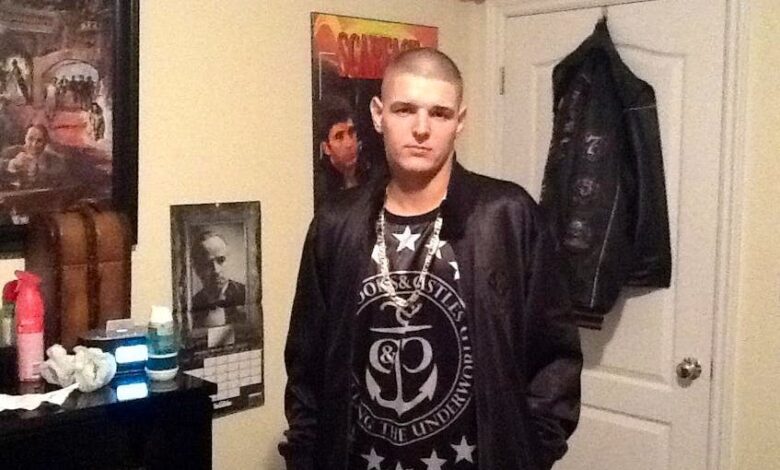Devlin Glasgow’s parole ineligibility for Halifax murder set at 16 years

HALIFAX, N.S. — Devlin Tyson Glasgow must serve 16 years of his life sentence for second-degree murder in the October 2013 shooting death of Matthew Sudds before he can apply for parole.
Glasgow, 37, was arrested in October 2019 in British Columbia, where he was in prison for firearm offences, and transported to Halifax to face a charge of first-degree murder.
He stood trial in Nova Scotia Supreme Court last winter. The jury deliberated for about four hours before finding him guilty March 4 of the lesser offence of second-degree murder.
A hearing was held Tuesday in Halifax to determine how many years – somewhere between 10 and 25 – Glasgow has to serve before he is eligible for parole.
Crown attorney Sean McCarroll requested a 17-year period of parole ineligibility. Defence lawyer Sid Freeman, who participated in the hearing via a video link from Toronto, recommended a 15-year waiting period.
Justice Josh Arnold decided the appropriate figure was 16 years. That means Glasgow will be in prison for about 12 more years before he can seek parole.
“The imposition of life imprisonment already carries with it the significant element of denunciation and general deterrence,” Arnold said.
“Mr. Glasgow may never be released on parole. He might spend the rest of his life in prison. However, the (Parole Board of Canada) might eventually determine that he can return to society.
“If the parole board does determine that Mr. Glasgow can leave prison, he will be subject to strict conditions and supervision. Even then, that supervision and those strict conditions would be imposed for life.”
Shot in head
Sudds, 24, went missing Oct. 10, 2013. His body was discovered four days later in bushes along Africville Road in north-end Halifax. He had been shot at least twice, including once in the head.
Glasgow was one of two men charged in the killing.
Ricardo Jerrel Whynder, 39, stood trial in Supreme Court last spring on a charge of second-degree murder and was found guilty of the lesser offence of manslaughter.
The Crown is considering applying to have Whynder declared a dangerous offender and locked up indefinitely. He is currently undergoing a forensic risk assessment prior to his sentencing hearing.
According to the facts heard at Glasgow’s trial, he took a flight to Halifax from Vancouver on Oct. 9, 2013 – the day before the killing – using a ticket that was purchased at the last minute.
Whynder met Glasgow at the Halifax airport and they spent part of Oct. 10 together. Whynder communicated with Sudds by cellphone that day.
That evening, Sudds agreed to meet the men in the parking lot of the Burger King on Young Street in Halifax. He got into the front seat of a black Dodge Charger that was being driven by Whynder, with Sudds sitting in the back.
The Charger was driven to Africville Road, where the shooting occurred outside the vehicle. No motive has been established for the killing.
Glasgow and Whynder left Halifax the next day on the same flight. They hugged and shook hands before going their separate ways at the Toronto airport.
“Mr. Glasgow was convicted of second-degree murder, not a planned and premeditated murder,” Arnold said in his decision Tuesday. “However, it is clear from the evidence heard at trial that something nefarious was afoot.”
Impact statements
Darlene Sudds, in a victim impact statement, said she had the privilege of being Matthew’s mother for over 24 years “before he was so cruelly taken from me.
“Matthew was and will forever be the light of my life. Mother and son share a special bond, and although Matthew is gone, our bond remains the same.”
She said the last time she saw her son, he asked her to pick up a pumpkin pie at Costco.
“Later, I had an unexplainable feeling that only a mother could feel that something was not right,” she wrote. “Upon hearing that the police had found the body of a young man … my heart broke, and I instantly knew it was my son Matthew, however I prayed I was wrong.
“When the police confirmed Matthew’s identity, you can only begin to know all the feelings that consumed me. I shut down, feeling lost, empty, hurt and very angry.
“The grief never leaves. It’s always with me. I still fight through my grief for Matthew every day. It has made me a different person, and so much stronger than ever to be able to fight every day and seek the peace and justice Matthew and I deserve.”
The court also heard impact statements from a woman who is Darlene’s best friend and was Matthew’s godmother, and from two of Matthew’s cousins.
“The family of Matthew Sudds has suffered profound loss, and they are still suffering from the fallout caused by this crime,” McCarroll, the prosecutor, told the court.
‘Criminal lifestyle’
He said Glasgow has criminal convictions in four different provinces, including one for aggravated assault from an incident in Halifax in 2005 in which he shot a man five times and others for trafficking firearms and breaching firearm prohibitions.
“This is an individual who’s deeply entrenched in a criminal lifestyle,” the Crown attorney said.
An in-depth cultural assessment on Glasgow, who is African Nova Scotian, was prepared for the sentencing.
“The Crown acknowledges Mr. Glasgow’s difficult upbringing and the impacts of systemic racism … on (his) life journey thus far,” McCarroll said.
“Mr. Glasgow’s environment and cultural identity have disadvantaged him. … That being said, it does not excuse his actions. This was a heinous act, where a young man was shot down in an overgrown ditch and left to die while his loved one wondered where he was.”

The judge said Glasgow was the principal or a party to Sudds’ murder, which was committed with a .40-calibre handgun.
“Mr. Glasgow reports that he himself has been shot twice, and basically says that it came with the territory of his chosen criminal lifestyle,” Arnold said.
The judge spoke at great length about Glasgow’s cultural assessment and said he considered the systemic racism he has encountered and will face in the federal prison system in reaching his decision.
Outside court, Darlene Sudds said she’s glad Glasgow’s case is over. She said the last 10 years have been miserable.
“It’s been a lot,” McCarroll said of the family’s ordeal. “This has been hanging over their heads since 2013, so it’s hard day for them and a long time coming.
“It’s taken 10 years to reach this point, but I think it speaks positive to the system. It shows that when crimes like this are committed, police are not going to stop investigating. … (They) keep on going.
“And it’s the same for the Crown prosecutors’ office. We’re going to continue to pursue these matters until justice is served.”




